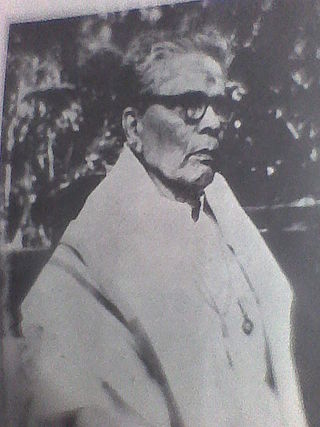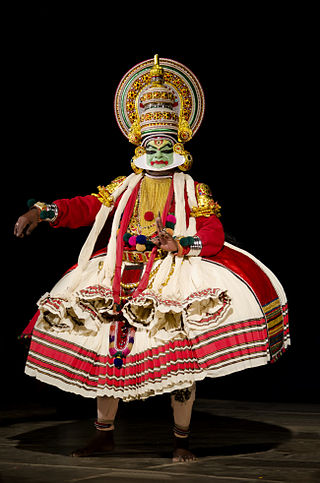Related Research Articles

Guru Chenganoor Raman Pillai, also spelt Chengannur Raman Pillai (1886–1980), was a celebrated Kathakali artist from Kerala in south India. He was known for his brilliant portrayal of the anti-heroic Kathi roles on stage, and was the head of palace kathakali yogam to the Travancore Maharaja in a career spanning almost 65 years.
Neralattu Rama Poduval or Njaralathu Rama Poduval (1916–1996) was an exponent of the ashtapadi/sopanam music form practised in Kerala in southern India. A recipient of the Kendra Sangeet Natak Akademi Award, he hailed from a rugged village called Thiruvaazhaamkunnu, near Mannarkkad in Palakkad district and lived most of life in Angadipuram in Malappuram district, the place famous for the Thirumanthamkunnu Temple.
Kalamandalam Krishnan Nair was a Kathakali dancer from Kerala in India.

Kalamandalam Ramankutty Nair was a performer of Kathakali, who practiced the Kerala art form for more than seven decades.

Kalamandalam Vasu Pisharody was an Indian Kathakali actor known for his classical dance-drama of Kerala. A frontline disciple of Padma Shri Vazhenkada Kunchu Nair, he exceled in virtuous pachcha, anti-hero Kathi and the semi-realistic minukku roles alike. Nalan, Bahukan, Arjunan, Bhiman, Dharmaputrar, Rugmangadan, Narakaasuran, Ravanan, Parashuraman and Brahmanan were his masterpieces. Vasu Pisharody performed Kathakali all over India and visited foreign countries about 20 times.

Sadanam Krishnankutty is a performer of Kathakali, a classical dance-drama form of Kerala, South India. A recipient of Kerala State Kathakali award and Kalamandalam fellowship, he has played a wide range of characters in his acts. He received the Kerala Sangeetha Nataka Akademi Award in 2002, the Sangeet Natak Akademi Award in 2007, Honorary D.litt from Thunchath Ezhuthachan Malayalam University, Thirur, Kerala in 2021 and the Sangeet Natak Akademi Fellowship in 2021.

Nelliyode Vasudevan Namboodiri or Nelliyod Vasudevan Namboodiri was a Kathakali artiste, noted primarily for his vibrant portrayal of the evil chuvanna thaadi roles of the classical Kathakali dance-drama from Kerala in south India. He was also very famous and known for the characters 'Kuchelan' from Kuchelavritham and 'Aashaari' from Bakavadham.
Mankompu Sivasankara Pillai, of Kerala in south India, was a Kathakali artist of the classical dance-drama's southern style. Noted for his consummate depiction of pachcha, kathi and minukku roles, he is a disciple of Chenganoor Raman Pillai.
Kalamandalam Appukutty Poduval (1924–2008) was a maddalam maestro who rose to prominence by his aesthetically pleasing taps on the instrument—a vital percussion accompaniment for Kathakali, the classical dance-drama from Kerala in south India. A disciple of the legendary Venkichan Swami, he, along with chenda exponent, Kalamandalam Krishnankutty Poduval, ushered in a new spring in the acoustics of their performing art.

Mavelikkara Velukutty Nair was an Indian mridangam player.

Gopala Pillai Sankara Pillai, better known as G. Sankara Pillai, was an Indian playwright, literary critic, and director, known to be one of the pioneers of modern Malayalam theatre. A proponent of total theater, he was the founder of Nataka Kalari movement in Kerala and the chairman of the Kerala Sangeeta Nataka Akademi. He was a recipient of a number of awards including the Kerala Sahitya Akademi Award for Drama in 1964 for the work Rail Palangal and the Sangeet Natak Akademi Award for the best playwright in 1979.

Kavungal Chathunni Panicker (1922-2007) was an Indian classical dancer, known for his proficiency in Kathakali, the traditional dance form of Kerala. He was an exponent of the Kavungal School of Kathakali, noted for its rigorous training methods and overt physical interpretation of abhinaya. He is known to have brought innovations to the dance form, especially in the decorative movements (kalasam) and his contributions are reported in the development of grammar and costumes for the Kavungal School. A recipient of the Sangeet Natak Akademi Award in 1973, Panicker was honored again by the Government of India, in 2006, with the fourth highest Indian civilian award of Padma Shri.

Kalamandalam Gangadhran was a Kathakali musician from Kerala. His unique tenor and accent has earned him a large audience both within and outside Kerala. He was the most prominent disciple of Kalamandalam Neelakandan Nambeesan, and the Master of the many later generations of Kathakali Musicians. He was a visiting professor at Margi, an organization dedicated to the revival of Kathakali and Kutiyattom, two classical art forms of Kerala. In 2006, he was honoured by the Sangeet Natak Akademi Award. Aasan is a documentary film made on the musical life of the Kathakali of Kalamandalam Gangadhran directed by Ratheesh.

Chemancheri Kunhiraman Nair, also known as Guru Chemancheri was an Indian Kathakali actor. He spent over eighty years learning and teaching and performing Kathakali, a major form of classical Indian dance. The Government of India awarded him the fourth highest civilian honour, Padma Shri in 2017.
Mathoor Govindan Kutty was an Indian Kathakali artist from the state of Kerala. In a career spanning over six decades, he specialized in Kathakali Stri Vesham, the portrayal of female characters on stage. He was the recipient of the 2011 Kerala State Award for the best Kathakali artist, 2010 Kerala Sangeetha Nataka Akademi Award and the 2005 Sangeet Natak Akademi Award for contributions to the Kathakali art form.

Kalamandalam Ramachandran Unnithan is a Kathakali exponent from Kerala, India. He received several awards including the Sangeet Natak Akademi Award 2016. His biography titled Kachaiyum Mizhukkum was published in 2015.
Kalamandalam Rajan was a Kathakali exponent from Kerala, India. He has received the Sangeet Natak Akademi Award 2009, Kerala Sangeetha Nataka Akademi Gurupooja award 2006.
Champakulam Pachu Pillai is a Kathakali exponent from Kerala, India. He was a specialist in the thadi or bearded roles in kathakali. He has been honored with several noted awards including the Sangeet Natak Akademi Award 1983, Kerala Sangeetha Nataka Akademi Award 1969 and Kerala Kalamandalam Award 1991.

Madambi Subramanian Namboodiri is a Kathakali musician from Kerala, India. He received several noted awards including the Sangeet Natak Akademi Award, Kerala State Kathakali Award, Kerala Sangeetha Nataka Akademi Award and Kerala Kalamandalam Award.
Varanasi Vishnu Namboothiri is a Maddalam exponent from Kerala, India, best known for playing Maddalam for Kathakali performances. He received several noted awards including Sangeet Natak Akademi Award, Kerala Sangeetha Nataka Akademi Gurupooja Award and Kerala Kalamandalam Award.
References
- 1 2 3 4 5 6 "തോന്നയ്ക്കൽ പീതാംബരൻ | കഥകളി.ഇൻഫൊ | Kathakali.info | കളിയറിവുകളുടെ തിരമൊഴി | The internet Kathakali hangout". kathakali.info. Archived from the original on 18 January 2022. Retrieved 17 January 2022.
- 1 2 3 4 "Thonnakkal Peethambaran - Kathakali Maestro". Kerala Tourism. Department of Tourism, Government of Kerala. Archived from the original on 18 January 2022. Retrieved 17 January 2022.
- ↑ "കലാമണ്ഡലം ഗോപിക്ക് അക്കാദമി ഫെലോഷിപ് | Madhyamam". www.madhyamam.com (in Malayalam). 17 December 2011. Archived from the original on 18 January 2022. Retrieved 17 January 2022.
- ↑ "Kathakali, Awards, Kerala Sangeetha Nataka Akademi". www.keralaculture.org. Archived from the original on 18 January 2022. Retrieved 17 January 2022.
- ↑ ഡെസ്ക്, വെബ് (8 February 2019). "മടവൂര് വാസുദേവൻ നായർ അനുസ്മരണം | Madhyamam". www.madhyamam.com (in Malayalam). Archived from the original on 18 January 2022. Retrieved 17 January 2022.